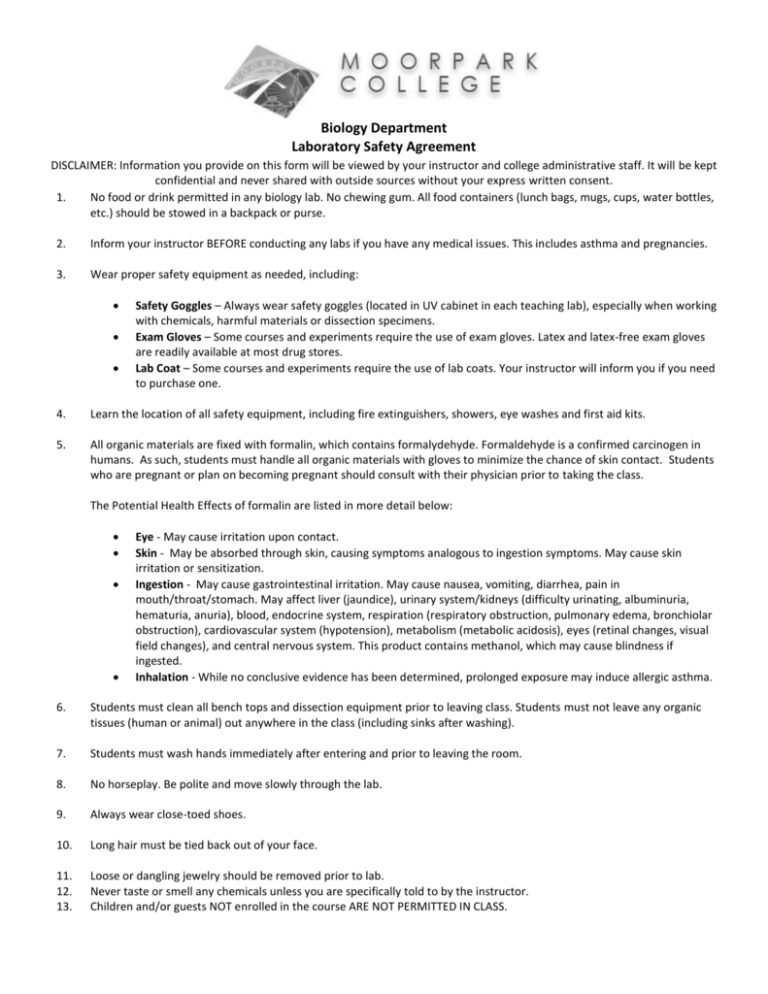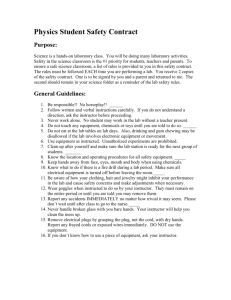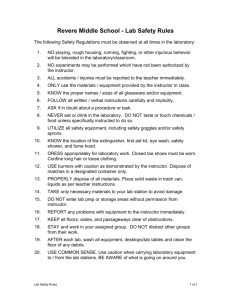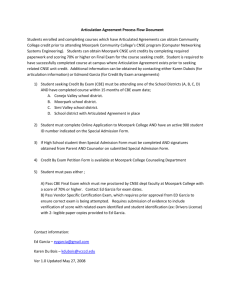biology_department_safety_contract
advertisement

Biology Department Laboratory Safety Agreement DISCLAIMER: Information you provide on this form will be viewed by your instructor and college administrative staff. It will be kept confidential and never shared with outside sources without your express written consent. 1. No food or drink permitted in any biology lab. No chewing gum. All food containers (lunch bags, mugs, cups, water bottles, etc.) should be stowed in a backpack or purse. 2. Inform your instructor BEFORE conducting any labs if you have any medical issues. This includes asthma and pregnancies. 3. Wear proper safety equipment as needed, including: Safety Goggles – Always wear safety goggles (located in UV cabinet in each teaching lab), especially when working with chemicals, harmful materials or dissection specimens. Exam Gloves – Some courses and experiments require the use of exam gloves. Latex and latex-free exam gloves are readily available at most drug stores. Lab Coat – Some courses and experiments require the use of lab coats. Your instructor will inform you if you need to purchase one. 4. Learn the location of all safety equipment, including fire extinguishers, showers, eye washes and first aid kits. 5. All organic materials are fixed with formalin, which contains formalydehyde. Formaldehyde is a confirmed carcinogen in humans. As such, students must handle all organic materials with gloves to minimize the chance of skin contact. Students who are pregnant or plan on becoming pregnant should consult with their physician prior to taking the class. The Potential Health Effects of formalin are listed in more detail below: Eye - May cause irritation upon contact. Skin - May be absorbed through skin, causing symptoms analogous to ingestion symptoms. May cause skin irritation or sensitization. Ingestion - May cause gastrointestinal irritation. May cause nausea, vomiting, diarrhea, pain in mouth/throat/stomach. May affect liver (jaundice), urinary system/kidneys (difficulty urinating, albuminuria, hematuria, anuria), blood, endocrine system, respiration (respiratory obstruction, pulmonary edema, bronchiolar obstruction), cardiovascular system (hypotension), metabolism (metabolic acidosis), eyes (retinal changes, visual field changes), and central nervous system. This product contains methanol, which may cause blindness if ingested. Inhalation - While no conclusive evidence has been determined, prolonged exposure may induce allergic asthma. 6. Students must clean all bench tops and dissection equipment prior to leaving class. Students must not leave any organic tissues (human or animal) out anywhere in the class (including sinks after washing). 7. Students must wash hands immediately after entering and prior to leaving the room. 8. No horseplay. Be polite and move slowly through the lab. 9. Always wear close-toed shoes. 10. Long hair must be tied back out of your face. 11. 12. 13. Loose or dangling jewelry should be removed prior to lab. Never taste or smell any chemicals unless you are specifically told to by the instructor. Children and/or guests NOT enrolled in the course ARE NOT PERMITTED IN CLASS. Laboratory Safety Agreement 14. All glassware should be washed/rinsed after use (unless instructed otherwise). Place used slides and coverslips in the appropriate containers. 15. Never discard broken glass into the trash can. Use the container marked “Broken Glass” located in each lab room. 16. Consult your instructor for proper disposal of all reagents/chemicals. Never pour chemicals down the drain unless specially instructed to do so. 17. Discard used media plates and items contaminated with human tissue in the marked, red bio-hazardous waste containers. 18. Learn the proper use of all equipment before attempting an experiment. If you are unsure, consult your instructor. 19. IMMEDIATELY REPORT ALL INJURIES, SPILLS, BROKEN GLASS OR OTHER LAB HAZARDS TO YOUR INSTRUCTOR. 20. Field Trips – field trips are a unique experience to some courses offered by the Biology Department. The Student Code of Conduct applies to Moorpark College sanctioned field trips no matter where they take place. a. b. c. d. e. f. g. h. i. j. No drugs or alcohol at ANYTIME on field trips No dangerous behavior (i.e. climbing cliffs, boulders, trees etc.) You MUST wear seat belts in college vans and smoking IS NOT allowed Obey ALL rules of the field trip venue (especially noise) No friends, pets, or children No defacing public or private features Please be prepared with appropriate clothing and provisions for the field trip (including water, food, sun protection) Notify your instructor of any medical conditions or allergies – bites, stings and exposure to allergens is common on field trips DON’T BE LATE Remember – You are representing Moorpark College on your field trips – please act professionally Instructors will present additional safety information specific to each lab. Please make sure to listen to and follow these directions. If you have any questions about a chemical, equipment, procedure or safety concern, ask your instructor before you attempt the experimental procedure. I am a student at Moorpark College, have read and understood all Laboratory Safety Rules and Emergency Contact Information. I agree to follow all safety rules and procedures contained therein and experiment-specific rules given by my instructor. I will conduct myself in a safe and conscientious manner in the laboratory. I will not perform any unauthorized lab procedure. If I do not know/understand the proper use of equipment, experimental procedure, use of a chemical or have a safety concern, I will ask the instructor before continuing with any experiment. I understand that misbehavior in the lab or failure to follow safe lab procedures could cause a serious accident. I further understand that a violation of these rules could result in my not being allowed to participate in future lab exercises. Signature (Electronic): THIS COPY IS FOR YOUR RECORDS. PLEASE SUBMIT YOUR ELECTRONIC COPY ONLINE www.tinyurl.com/safetymcbio SAFETY INFORMATION Moorpark College Campus Police: (805) 378-1455 Student Health Center: (805) 378-1413 Evening/Weekend Facilitator: (805) 378-1406 For life-threatening emergencies, contact the Campus Police (or 911 if no answer) For non-life-threatening injuries or acute illness, contact the Student Health Center (or Campus Police if no answer). For after-hours issues with facilities or equipment, contact the Evening/Weekend Facilitator. Page 2 of 2







